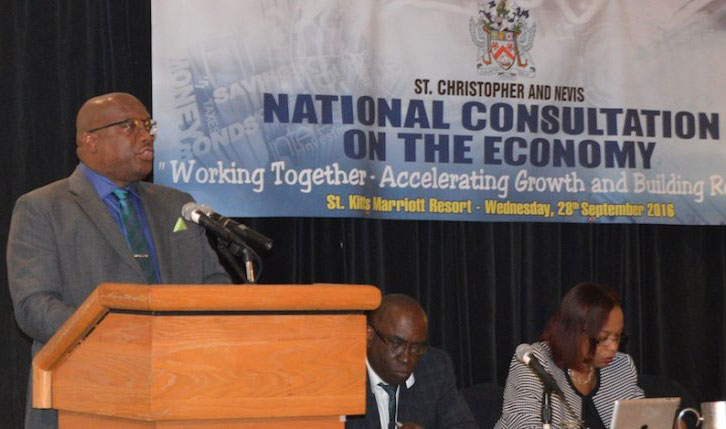At his press conference on Wednesday, October 26th, Prime Minister Dr. the Honourable Timothy Harris, who is the Minister of Finance, pointed to further signs that the Team Unity Government is managing the country’s finances expertly.
“Recurrent revenue for the first nine months of 2016 totals $480.7 million: 9 percent above our budget. The tax revenue of $296.6 million was up over budget, and over the 2015 comparator,” Prime Minister Harris stated at Wednesday’s press conference, adding: “The fact that all of the revenue heads are performing above budget is a clear indication that something positive is happening in the economy, and that can’t be denied.”
Dr. Harris also said that, “Our fiscal accounts up to September 2016 record a recurrent surplus of $120.3 million, an overall surplus of $124.2 million, and a primary surplus of $141.6 million. Coming out of the Monetary Council meeting held last Friday, October 21st, we know that St. Kitts and Nevis is projected by our Central Bank to have the highest primary balance in the sub-region for the period 2016 to 2018. This is a major achievement for the new administration.”
Another major fiscal achievement for the Team Unity administration came last year when St. Kitts and Nevis collected the most tax revenues to date. Total gross taxes and fees collected at the Inland Revenue Department amounted to $219.3 million, as at November 30th, 2015.
Two months later, Dr. Harris reported on January 26th during the sitting of the National Assembly that the greatest Discounted VAT-Rate Day sales were also recorded in 2015 since the initiative was launched in 2011. He said then that preliminary data for Discounted VAT-Rate Day 2015 put the sales amount at $41 million: $1 million more than the Discounted VAT-Rate Day sales recorded in 2014.
Last year’s record Discounted VAT-Rate Day sales point to a vastly improved local economy, as well as a more prosperous consumer class. This also implies that the Team Unity Government’s removal of the 17 percent value-added tax (VAT) from food, medicines, educational supplies and funeral expenses, effective April 7th, 2015, has boosted consumer spending and an appetite for consumer durables, such as automobiles, jewelry, and household goods (appliances, electronics, furniture, etc.), due to the release of pent-up consumer demand.
Last year’s record tax collection indicates that the reduction in VAT revenues was offset positively by solid performances in other tax categories, a fact acknowledged by the International Monetary Fund (IMF) in its May 13th, 2016 press release about St. Kitts and Nevis. “The impact of the VAT and import duty exemptions were largely offset by stronger income tax collection and higher-than-expected outturn of other taxes on international trade,” the IMF said.
Improvements in the administration of the government’s tax regime (such as taking a measured approach towards the granting of concessions and making its collections systems more efficient and effective) account for the stronger income tax collection, and this disciplined approach forms part and parcel of the Team Unity Government’s focus on fiscal responsibility.
In a November 2015 interview with the St. Kitts and Nevis Information Service (SKNIS), the Financial Secretary, Mrs. Hilary Hazel, assured the public that, “As promised by Prime Minister Harris, the 2016 Budget will be based on two premises: One, that there would be no new taxes and, secondly, we would not entertain a deficit budget. Fiscal responsibility and fiscal discipline would be two of the main guiding factors in terms of the discussions on the budget.”
Regarding the 2017 Budget, the Prime Minister of St. Kitts and Nevis said on Wednesday that, “We expect that the 2017 Budget will be delivered well in advance of the constitutional deadline, and the constitutional deadline provides for expenditure to continue up to a period of 120 days from the commencement of the financial year, which starts in January. So we are looking in practical terms up to April 2017. Nonetheless, we intend by mid-December to deliver the Federal Budget.”





